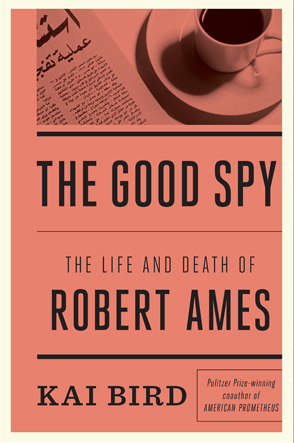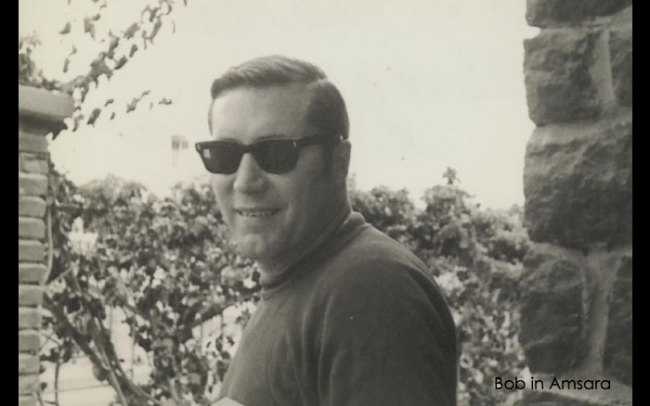How a quiet father of 6 became one of America’s most important spies
By Korea HeraldPublished : June 5, 2014 - 20:08
I never met CIA officer Robert Ames, though our paths overlapped in the Middle East, particularly in Beirut during some of the worst months of Lebanon’s 1975-90 civil war. The ruins of the U.S. Embassy building where Ames met his demise in April 1983 was just down the street from my first residence when I moved to Beirut four months later.
His favorite restaurants became mine. We had talked to a lot of the same figures whose names, at the time, were synonymous with Middle East danger and intrigue. The same group of pro-Iran Shiite radicals who organized the truck bomb explosion that killed Ames also kidnapped me the following year. That small splinter group would later become known as Hezbollah.
Strange how a place so utterly terrifying and brutal can also be the source of the most wonderful experiences in one’s life. But I have no doubt, especially after reading Kai Bird’s biography, “The Good Spy: The Life and Death of Robert Ames,” that Ames cherished his experiences as much as did all of Beirut’s war-addicted spooks and journalists.
His favorite restaurants became mine. We had talked to a lot of the same figures whose names, at the time, were synonymous with Middle East danger and intrigue. The same group of pro-Iran Shiite radicals who organized the truck bomb explosion that killed Ames also kidnapped me the following year. That small splinter group would later become known as Hezbollah.
Strange how a place so utterly terrifying and brutal can also be the source of the most wonderful experiences in one’s life. But I have no doubt, especially after reading Kai Bird’s biography, “The Good Spy: The Life and Death of Robert Ames,” that Ames cherished his experiences as much as did all of Beirut’s war-addicted spooks and journalists.


Bird faced a tough task researching and writing this book, having not been part of that community and relying entirely on others’ memories for his fascinating story of a CIA officer’s life in the shadows. The CIA was less than cooperative in sharing details of Ames’ 23-year intelligence career.
And the way Ames lived and conducted his work made it particularly difficult to turn his experiences into a compelling narrative. The quiet, straight-laced, responsible father of six appears to have had a dry personality. He drank in moderation and exhibited no major quirks.
Those traits, which partially explain the title, “The Good Spy,” certainly fit the CIA’s requirements for an undercover agent assigned to traversing a dangerous region while never drawing attention to himself. But it clearly left Bird lacking in action-packed vignettes.
The story isn’t actually about Ames. It’s about the people who drove Ames’ career, including some of the world’s most infamous, despised and misunderstood personalities, like Palestine Liberation Organization leader Yasser Arafat and his deputy, Ali Hassan Salameh, founder of the PLO’s secret special-operations unit, Force 17.
All U.S. government contacts with these two men were officially banned under successive U.S. administrations. Ames developed and maintained these contacts anyway, to the point of conducting active peace negotiations with the knowledge of U.S. presidents, secretaries of state and the top echelon of CIA bosses.
Ames played a key role in setting the foundation for the 1993 Oslo peace accords and prompting U.S. recognition of the need for Palestinian self-determination.
Israel’s leadership had an inkling of these secret contacts, Bird writes, and worked hard to sabotage them, in part for fear the PLO would be empowered. Israel also believed Salameh had been behind the 1972 massacre of Israeli athletes and coaches at the Munich Olympics.
At a crucial moment in Ames’ negotiations in early 1979, Israeli agents killed Salameh in Beirut.
Bird expertly captures the bizarre interplay between the United States and its then-PLO enemies. The same PLO made infamous for airplane hijackings and car bombings was the organization that provided intelligence and crucial security for U.S. Embassy operations at a time of lawlessness and chaos on Beirut’s streets.
When that security element disappeared after the Israeli invasion of 1982, the embassy and its personnel were left vulnerable just as radical Shiite groups backed by Iran and Syria were ascendant. That vulnerability translated into two catastrophic U.S. Embassy bomb attacks, the bombing of a U.S. Marines barracks, and elimination of the CIA’s top echelon of resident Middle East agents.
Ames was one of the few who recognized the dangers and understood why open lines of communication are essential, even with those whom Washington regards with utter contempt. For Middle East fanatics like me, Bird’s account fills a major gap in our understanding of a transformative era. For everyone else, it’s just a ripping-good tale of intrigue.
By Tod Robberson
(The Dallas Morning News)
(MCT Information Services)
-
Articles by Korea Herald


![[AtoZ into Korean mind] Humor in Korea: Navigating the line between what's funny and not](http://res.heraldm.com/phpwas/restmb_idxmake.php?idx=644&simg=/content/image/2024/04/22/20240422050642_0.jpg&u=)
![[Exclusive] Korean military set to ban iPhones over 'security' concerns](http://res.heraldm.com/phpwas/restmb_idxmake.php?idx=644&simg=/content/image/2024/04/23/20240423050599_0.jpg&u=20240423183955)



![[Graphic News] 77% of young Koreans still financially dependent](http://res.heraldm.com/phpwas/restmb_idxmake.php?idx=644&simg=/content/image/2024/04/22/20240422050762_0.gif&u=)
![[Herald Interview] Why Toss invited hackers to penetrate its system](http://res.heraldm.com/phpwas/restmb_idxmake.php?idx=644&simg=/content/image/2024/04/22/20240422050569_0.jpg&u=20240422150649)






![[Exclusive] Korean military to ban iPhones over security issues](http://res.heraldm.com/phpwas/restmb_idxmake.php?idx=652&simg=/content/image/2024/04/23/20240423050599_0.jpg&u=20240423183955)



![[Today’s K-pop] Ateez confirms US tour details](http://res.heraldm.com/phpwas/restmb_idxmake.php?idx=642&simg=/content/image/2024/04/23/20240423050700_0.jpg&u=)